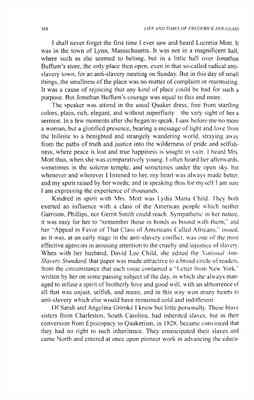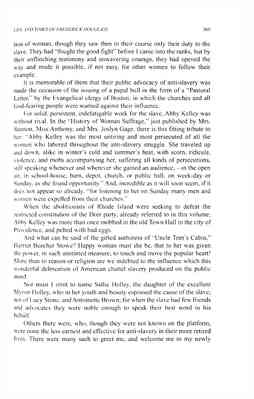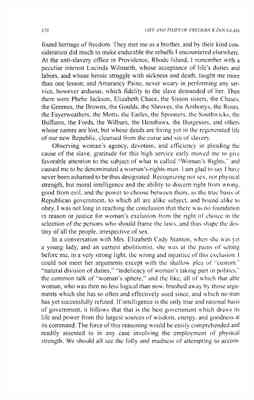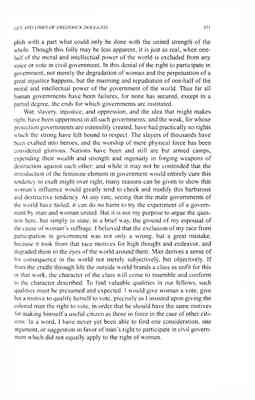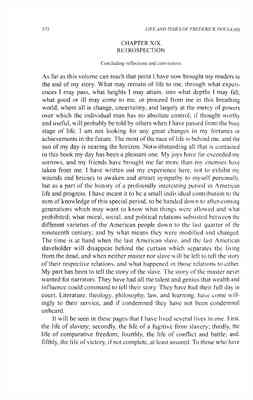Pages
216
368
LIFE AND TIMES OF FREDERICK DOUGLASS
I shall never forget the first time I ever saw and heard Lucretia Mott. It was in the town of Lynn, Massachusetts. It was not in a magnificent hall, where such as she seemed to belong, but in a little hall over Jonathan Buffum's store, the only place then open, even in that so-called radical anti-slavery town, for an anti-slavery meeting on Sunday. But in this day of small things, the smallness of the place was no matter of complaint or murmuring. It was a cause of rejoicing that any kind of place could be had for such a purpose. But Jonathan Buffum's courage was equal to this and more.
The speaker was attired in the usual Quaker dress, free from startling colors, plain, rich, elegant, and without superfluity—the very sight of her a sermon. In a few moments after she began to speak, I saw before me no more a woman, but a glorified presence, bearing a message of light and love from the Infinite to a benighted and strangely wandering world, straying away from the paths of truth and justice into the wilderness of pride and selfishness, where peace is lost and true happiness is sought in vain. I heard Mrs. Mott thus, when she was comparatively young. I often heard her afterwards, sometimes in the solemn temple, and sometimes under the open sky, but whenever and wherever I listened to her, my heart was always made better, and my spirit raised by her words; and in speaking thus for myself I am sure I am expressing the experience of thousands.
Kindred in spirit with Mrs. Mott was Lydia Maria Child. They both exerted an influence with a class of the American people which neither Garrison, Phillips, nor Gerrit Smith could reach. Sympathetic in her nature, it was easy for her to "remember those in bonds as bound with them;" and her "Appeal in Favor of That Class of Americans Called Africans," issued, as it was, at an early stage in the anti-slavery conflict, was one of the most effective agencies in arousing attention to the cruelty and injustice of slavery. When with her husband, David Lee Child, she edited the National Anti-Slavery Standard, that paper was made attractive to a broad circle of readers, from the circumstance that each issue contained a "Letter from New York," written by her on some passing subject of the day, in which she always managed to infuse a spirit of brotherly love and good will, with an abhorrence of all that was unjust, selfish, and mean, and in this way won many hearts to anti-slavery which else would have remained cold and indifferent.
Of Sarah and Angelina Grimké I knew but little personally. These brave sisters from Charleston, South Carolina, had inherited slaves, but in their conversion from Episcopacy to Quakerism, in 1828, became convinced that they had no right to such inheritance. They emancipated their slaves and came North and entered at once upon pioneer work in advancing the educa
217
LIFE AND TIMES OF FREDERICK DOUGLASS
369
tion of woman, though they saw then in their course only their duty to the slave. They had "fought the good fight" before I came into the ranks, but by their unflinching testimony and unwavering courage, they had opened the way and made it possible, if not easy, for other women to follow their example.
It is memorable of them that their public advocacy of anti-slavery was made the occasion of the issuing of a papal bull in the form of a "Pastoral Letter," by the Evangelical clergy of Boston, in which the churches and all God-fearing people were warned against their influence.
For solid, persistent, indefatigable work for the slave, Abby Kelley was without rival. In the "History of Woman Suffrage," just published by Mrs. Stanton, Miss Anthony, and Mrs. Joslyn Gage, there is this fitting tribute to her: "Abby Kelley was the most untiring and most persecuted of all the women who labored throughout the anti-slavery struggle. She traveled up and down, alike in winter's cold and summer's heat, with scorn, ridicule, violence, and mobs accompanying her, suffering all kinds of persecutions, still speaking whenever and wherever she gained an audience,— in the open air, in school-house, barn, depot, church, or public hall, on week-day or Sunday, as she found opportunity." And, incredible as it will soon seem, if it does not appear so already, "for listening to her on Sunday many men and women were expelled from their churches."
When the abolitionists of Rhode Island were seeking to defeat the restricted constitution of the Dorr party. already referred to in this volume, Abby Kelley was more than once mobbed in the old Town Hall in the city of Providence, and pelted with bad eggs.
And what can be said of the gifted authoress of "Uncle Tom's Cabin," Harriet Beecher Stowe? Happy woman must she be, that to her was given the power, in such unstinted measure, to touch and move the popular heart! More than to reason or religion are we indebted to the influence which this wonderful delineation of American chattel slavery produced on the public mind.
Nor must I omit to name Sallie Holley, the daughter of the excellent Myron Holley, who in her youth and beauty espoused the cause of the slave; nor of Lucy Stone, and Antoinette Brown; for when the slave had few friends and advocates they were noble enough to speak their best word in his behalf.
Others there were, who, though they were not known on the platform, were none the less earnest and effective for anti-slavery in their more retired lives. There were many such to greet me, and welcome me to my newly
218
370
LIFE AND TIMES OF FREDERICK DOUGLASS
found heritage of freedom. They met me as a brother, and by their kind consideration did much to make endurable the rebuffs I encountered elsewhere. At the anti-slavery office in Providence, Rhode Island, I remember with a peculiar interest Lucinda Wilmarth, whose acceptance of life's duties and labors, and whose heroic struggle with sickness and death, taught me more than one lesson; and Amarancy Paine, never weary in performing any service, however arduous, which fidelity to the slave demanded of her. Then there were Phebe Jackson, Elizabeth Chace, the Sisson sisters, the Chases, the Greenes, the Browns, the Goulds, the Shroves, the Anthonys, the Roses, the Fayerweathers, the Motts, the Earles, the Spooners, the Southwicks, the Buffums, the Fords, the Wilburs, the Henshaws, the Burgesses, and others whose names are lost, but whose deeds are living yet in the regenerated life of our new Republic, cleansed from the curse and sin of slavery.
Observing woman's agency, devotion, and efficiency in pleading the cause of the slave, gratitude for this high service early moved me to give favorable attention to the subject of what is called "Woman's Rights," and caused me to be denominated a woman's-rights-man. I am glad to say I have never been ashamed to be thus designated. Recognizing not sex, nor physical strength, but moral intelligence and the ability to discern right from wrong, good from evil, and the power to choose between them, as the true basis of Republican government, to which all are alike subject, and bound alike to obey, I was not long in reaching the conclusion that there was no foundation in reason or justice for woman's exclusion from the right of choice in the selection of the persons who should frame the laws, and thus shape the destiny of all the people, irrespective of sex.
In a conversation with Mrs. Elizabeth Cady Stanton, when she was yet a young lady, and an earnest abolitionist, she was at the pains of setting before me, in a very strong light, the wrong and injustice of this exclusion. I could not meet her arguments except with the shallow plea of "custom," "natural division of duties," "indelicacy of woman's taking part in politics," the common talk of "woman 's sphere," and the like, all of which that able woman, who was then no less logical than now, brushed away by those arguments which she has so often and effectively used since, and which no man has yet successfully refuted. If intelligence is the only true and rational basis of government, it follows that that is the best government which draws its life and power from the largest sources of wisdom, energy, and goodness at its command. The force of this reasoning would be easily comprehended and readily assented to in any case involving the employment of physical strength. We should all see the folly and madness of attempting to accom
219
LIFF AND TIMES OF FREDERICK DOUGLASS
371
plish with a part what could only be done with the united strength of the whole. Though this folly may be less apparent, it is just as real, when one-half of the moral and intellectual power of the world is excluded from any voice or vote in civil government. In this denial of the right to participate in government, not merely the degradation of woman and the perpetuation of a great injustice happens, but the maiming and repudiation of one-half of the moral and intellectual power of the government of the world. Thus far all human governments have been failures, for none has secured, except in a partial degree, the ends for which governments are instituted.
War, slavery, injustice, and oppression, and the idea that might makes right, have been uppermost in all such governments; and the weak, for whose protection governments are ostensibly created, have had practically no rights which the strong have felt bound to respect. The slayers of thousands have been exalted into heroes, and the worship of mere physical force has been considered glorious. Nations have been and still are but armed camps, expending their wealth and strength and ingenuity in forging weapons of destruction against each other; and while it may not be contended that the introduction of the feminine element in government would entirely cure this tendency to exalt might over right, many reasons can be given to show that woman's influence would greatly tend to check and modify this barbarous and destructive tendency. At any rate, seeing that the male governments of the world have failed, it can do no harm to try the experiment of a government by man and woman united. But it is not my purpose to argue the question here, but simply to state, in a brief way, the ground of my espousal of the cause of woman's suffrage. I believed that the exclusion of my race from participation in government was not only a wrong, but a great mistake, because it took from that race motives for high thought and endeavor, and degraded them in the eyes of the world around them. Man derives a sense of his consequence in the world not merely subjectively, but objectively. If from the cradle through life the outside world brands a class as unfit for this or that work, the character of the class will come to resemble and conform to the character described. To find valuable qualities in our fellows, such qualities must be presumed and expected. I would give woman a vote, give her a motive to qualify herself to vote, precisely as I insisted upon giving the colored man the right to vote, in order that he should have the same motives for making himself a useful citizen as those in force in the case of other citizens. In a word, I have never yet been able to find one consideration, one argument, or suggestion in favor of man's right to participate in civil government which did not equally apply to the right of woman.
220
372
LIFE AND TIMES OF FREDERICK DOUGLASS
CHAPTER XIX. RETROSPECTION.
Concluding reflections and convictions.
As far as this volume can reach that point I have now brought my readers to the end of my story. What may remain of life to me, through what experiences I may pass, what heights I may attain, into what depths I may fall, what good or ill may come to me, or proceed from me in this breathing world, where all is change, uncertainty, and largely at the mercy of powers over which the individual man has no absolute control, if thought worthy and useful, will probably be told by others when I have passed from the busy stage of life. I am not looking for any great changes in my fortunes or achievements in the future. The most of the race of life is behind me, and the sun of my day is nearing the horizon. Notwithstanding all that is contained in this book my day has been a pleasant one. My joys have far exceeded my sorrows, and my friends have brought me far more than my enemies have taken from me. I have written out my experience here, not to exhibit my wounds and bruises to awaken and attract sympathy to myself personally, but as a part of the history of a profoundly interesting period in American life and progress. I have meant it to be a small individual contribution to the sum of knowledge of this special period, to be handed down to after-coming generations which may want to know what things were allowed and what prohibited; what moral, social, and political relations subsisted between the different varieties of the American people down to the last quarter of the nineteenth century; and by what means they were modified and changed. The time is at hand when the last American slave, and the last American slaveholder will disappear behind the curtain which separates the living from the dead, and when neither master nor slave will be left to tell the story of their respective relations, and what happened in those relations to either. My part has been to tell the story of the slave. The story of the master never wanted for narrators. They have had all the talent and genius that wealth and influence could command to tell their story. They have had their full day in court. Literature, theology, philosophy, law, and learning, have come willingly to their service, and if condemned they have not been condemned unheard.
It will be seen in these pages that I have lived several lives in one. First, the life of slavery; secondly, the life of a fugitive from slavery; thirdly, the life of comparative freedom; fourthly, the life of conflict and battle; and, fifthly, the life of victory, if not complete, at least assured. To those who have
